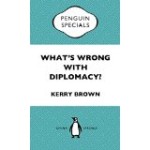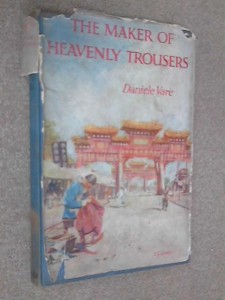The Best Writing by Diplomats from China – Don’t expect anything recent
Posted: April 21st, 2015 | 1 Comment » Reading Kerry Brown’s recent short, but measured, Penguin Special on the parlous state of diplomacy when it comes to China I couldn’t help pondering one of the problems that Brown posits with tact but I’ll mention with none – the generally poor state of most western nations diplomatic staff in China. Britain in particular has not had anyone able to offer much thought on China for some time now in Beijing. But once diplomats in China were fun, fascinating and all-round intellectuals, scholars and poets. Blandness is today’s key to being a top diplomat in China it seems – say nothing, do less, hold no opinions. It wasn’t always like that and the books below prove it…books we will never see the like of again now the age of the diplomat-scholar and diplomat-poet is long past….
Reading Kerry Brown’s recent short, but measured, Penguin Special on the parlous state of diplomacy when it comes to China I couldn’t help pondering one of the problems that Brown posits with tact but I’ll mention with none – the generally poor state of most western nations diplomatic staff in China. Britain in particular has not had anyone able to offer much thought on China for some time now in Beijing. But once diplomats in China were fun, fascinating and all-round intellectuals, scholars and poets. Blandness is today’s key to being a top diplomat in China it seems – say nothing, do less, hold no opinions. It wasn’t always like that and the books below prove it…books we will never see the like of again now the age of the diplomat-scholar and diplomat-poet is long past….
 Paul S Reinsch, An American Diplomat in China (1922). Reinsch was an early China Hugger who had the temerity to like China and the Chinese and actually believe in promoting the Open Door Policy, Wilson’s 14 Points and agenda for smaller, less powerful nations and had to resign after the First World War when Washington turned its back on all that. He was attacked for being soft on China, and for having a German surname, but he was a great American Ambassador and wrote a considered and affectionate book about his time in Peking. In An American Diplomat Reinsch fought back and defended his position and the Chinese – not a likely thing to appear on bookshelves these days from an Ambassador to the PRC.
Paul S Reinsch, An American Diplomat in China (1922). Reinsch was an early China Hugger who had the temerity to like China and the Chinese and actually believe in promoting the Open Door Policy, Wilson’s 14 Points and agenda for smaller, less powerful nations and had to resign after the First World War when Washington turned its back on all that. He was attacked for being soft on China, and for having a German surname, but he was a great American Ambassador and wrote a considered and affectionate book about his time in Peking. In An American Diplomat Reinsch fought back and defended his position and the Chinese – not a likely thing to appear on bookshelves these days from an Ambassador to the PRC.
 Daniele Vare’s The Maker of Heavenly Trousers (1935) is the best of several books Vare wrote while an Italian diplomat in Peking. He was urbane, stylish, extremely well read and very popular. A modern day diplomat would find wandering the hutongs for chance conversations with interesting merchants a bit tricky – they’re pretty much all bulldozed and somehow the tale of a walk round a Carrefour and a chat with the staff at a new Subway Sandwiches franchise is just not as charming.
Daniele Vare’s The Maker of Heavenly Trousers (1935) is the best of several books Vare wrote while an Italian diplomat in Peking. He was urbane, stylish, extremely well read and very popular. A modern day diplomat would find wandering the hutongs for chance conversations with interesting merchants a bit tricky – they’re pretty much all bulldozed and somehow the tale of a walk round a Carrefour and a chat with the staff at a new Subway Sandwiches franchise is just not as charming.
 Reginald Johnston was a British diplomat in Hong Kong and Weihaiwei and, of course, tutor to Pu Yi. Twilight in the Forbidden City (1934) is the story of that experience and the old Forbidden City. One imagines that the tutors of some horrid Red Prince at Harvard won’t get quite the same lush source material.
Reginald Johnston was a British diplomat in Hong Kong and Weihaiwei and, of course, tutor to Pu Yi. Twilight in the Forbidden City (1934) is the story of that experience and the old Forbidden City. One imagines that the tutors of some horrid Red Prince at Harvard won’t get quite the same lush source material.
Saint-John Perse’s Anabasis is a wonderful poem written in 1924 and then translated by none other than TS Eliot in 1930 (any diplomat poetry worthy of an Eliot translation currently!). Perse was actually Alexis Leger, the press attache at the French Legation in Peking between 1916 and 1921. While in Peking he wrote Anabasis and so it is suffused with imagery from China and Asia. It is simply beyond comprehension to imagine a diplomat in Beijing doing such a thing now!
 The marvelously named Count Damien de Martel and Baron Leon Viktorovich de Hoyer wrote Silhouettes of Peking in 1920 something or other – it was mildly scandalous at the time recounting various love affairs and infidelities. De Martel served as Chargé d’Affaires in the 1910s and Foreign Minister in the 1920s; De Hoyer was the Russian head of the Russo-Asiatic Bank’s Peking branch. Imagine the British Ambassador and the head of Standard Chartered in Beijing writing a racy, scandalous and immensely evocative book of the city after the fall of the Qing nowadays!
The marvelously named Count Damien de Martel and Baron Leon Viktorovich de Hoyer wrote Silhouettes of Peking in 1920 something or other – it was mildly scandalous at the time recounting various love affairs and infidelities. De Martel served as Chargé d’Affaires in the 1910s and Foreign Minister in the 1920s; De Hoyer was the Russian head of the Russo-Asiatic Bank’s Peking branch. Imagine the British Ambassador and the head of Standard Chartered in Beijing writing a racy, scandalous and immensely evocative book of the city after the fall of the Qing nowadays!

Enter comment here.